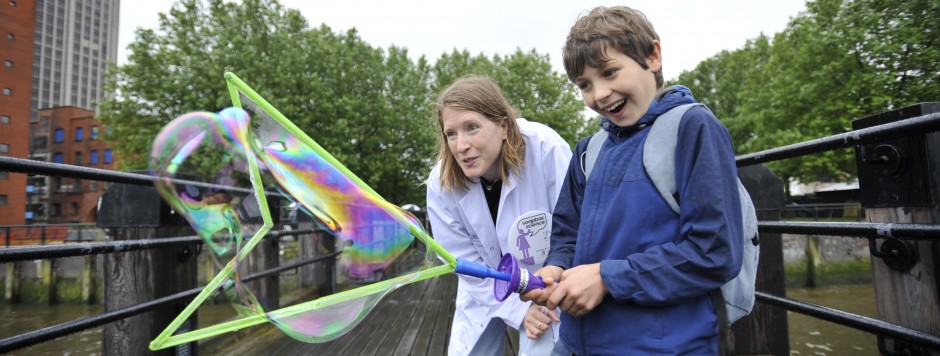 Samuela Guida started her PhD at Cranfield University in March 2017. Her project is about the removal of ammonia and phosphorus from wastewater and the recovery of these products as fertilizers. Before being discharged into the water streams, the wastewater needs to be treated to reduce the impact on the quality of the water itself. Samuela does this with a process called ion exchange, which captures the contaminant ions present in the wastewater and releases inert ions. The resins used in this process, called ion exchangers, can be then cleaned and the contaminants ions can be recovered as valuable products, such as fertilizers. Samuela’s work at Cranfield University is part of the SMART-Plant European project which has received funding from the European Union’s Horizon 2020 research and innovation programme under grant agreement No 690323
Samuela Guida started her PhD at Cranfield University in March 2017. Her project is about the removal of ammonia and phosphorus from wastewater and the recovery of these products as fertilizers. Before being discharged into the water streams, the wastewater needs to be treated to reduce the impact on the quality of the water itself. Samuela does this with a process called ion exchange, which captures the contaminant ions present in the wastewater and releases inert ions. The resins used in this process, called ion exchangers, can be then cleaned and the contaminants ions can be recovered as valuable products, such as fertilizers. Samuela’s work at Cranfield University is part of the SMART-Plant European project which has received funding from the European Union’s Horizon 2020 research and innovation programme under grant agreement No 690323
You can catch Samuela on a soapbox as part of Soapbox Science Milton Keynes on 30th June where she will talk about: “From water pollutants to fertilizers: a smart use of wastewater!”
Follow Samuela on Twitter: @samuela_guida
SS: How did you get to your current position?
SG: During the last year of my master degree in Industrial Biotechnology at the University of Padova, Italy, I started focusing on the environmental aspects of the biotechnologies and I decided to do an internship at the Ecole des Mines de Nantes, France, to study the removal of contaminants from wastewater. It was a completely new aspect of science to me and I was shocked at how wide the topic was. During a conference, I met two PhD students from Cranfield University, a place that I had never heard about. They told me about this University and its Water program. So, in December 2017, half panicking about my future, I came across the Cranfield University website and there was this amazing project similar to what I was doing in France – so I applied and here I am!
 SS: What, or who, inspired you to get a career in science?
SS: What, or who, inspired you to get a career in science?
SG: I’ve always been curious about how and why things happen. I remember when I was a really young kid and I was watching my mom making coffee with a Moka pot (…the “Italian way”). I was there standing in front of this magical machine that could transform water and ground coffee in a beverage that was as liquid as the water and it had the flavour of the ground coffee (again, I was a kid, everything amazed me!). I think that was the moment when I decided that I wanted to find the answers to all the “how?” and “why?” around me. Funny enough, scientific research and coffee are still closely linked to each other in my everyday life!
SS: What is the most fascinating aspect of your research/work?
SG: We live in an increasingly polluted world and many of the resources we use are finite or replenished much more slowly than we are using them. My research is a starting point towards finding a sustainable solution to these problems. The project offers an alternative to traditional wastewater treatment technologies and, at the same time, provides a method to recover nutrients as fertilizers that can be sold to maintain the economic feasibility of the entire process. I really think this is innovative and so exciting!
 SS: What attracted you to Soapbox Science in the first place?
SS: What attracted you to Soapbox Science in the first place?
SG: The possibility to involve non-experts in my work. I think that, as a PhD student, sometimes I am so focused on my to-do list that I forget why I am doing research. I believe Soapbox Science can help me to take a step back and look at my project from a different point of view. Moreover, the idea of an event with only female scientists makes me feel powerful! I think that showing young girls that science is not just for boys is incredibly important.
SS: Sum up in one word your expectations for the day
SG: Curiosity!
SS: If you could change one thing about the scientific culture right now, what would it be?
SG: The idea that equality and equity are the same concept. Equality means everyone receives the same thing, whereas equity means everyone receives what they need to achieve the same thing. Science should be equally accessible to everyone without any restriction caused by gender, social class, ethnicity or religion. There are so many incredible initiatives focused on removing gender bias (like Soapbox Science!) but equity is still something we have to work on. In an ideal world, a person would receive the tools to maximise her or his potential and to reach the best results in her or his work.
SS: What would be your top recommendation to a woman studying for a PhD and considering pursuing a career in academia?
SG: Step up, believe in yourself, and never let anyone tell you that you are not good enough.
